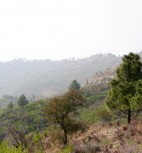Accordind to the 2002 South Asian Bat CAMP assessment report, Pakistan is also the home to five bats species that are globally near threatened and two vulnerable bat species. The proposed project is supposed to help to bring up to date our knowledge about the bat fauna present in Margalla Hills National Park, Islamabad. It is also the primary initiative to construct a sense of bat conservation among the park staff and locals residing within and neighboring areas of the Margalla Hills National Park.
Bats comprise of more than 25% known mammal species of Pakistan. Although eight bat species are reported to exist, the accurate number of chiropteran Taxa occurring within the country is tentative. Information on many species is based only on museum or literature surveys, with no recent inhabitants or distributional knowledge. The chiropteran biodiversity of the country is though comparable to any other region of the world with similar climatic conditions. Pakistan’s bat fauna is richer and more diverse than the largest bio-geographic region of the world – the Palaearctic: 25 genera and 8 families of bats exist in the Palaearctic as compared to Pakistan, where more than 50 species of bats representing 26 genera and 8 families are in attendance within a diminutive geographic area.
These mammals are rarely well thought-out in either environmental policies or educational projects in Pakistan. As an outcome, the country is unable to meet its pledge to the Convention on Biological Diversity (CBD), of which it is a signatory. There had been no long term field study on any bat species in Pakistan; this is the reason the proposed project will provide baseline information on the current standing and distribution of poorly known bat fauna of Margalla Hills National Park (Pakistan).
This proposed project was designed to cover both these aspects. Competence building of the individuals by providing equal opportunities to the female post-graduate students will be the core spotlight of this project. The proposed project will train future leaders of bat science in Pakistan who will be able (i) to preserve poorly known bat species and their habitats and (ii) resolve issue related to human-fruit bats clash agricultural areas of the country. Policies governing the management of biodiversity in Pakistan are in place. However, the paucity of scientific information on bats and the lack of trained personnel in wildlife science are the main impediments for effective conservation.
